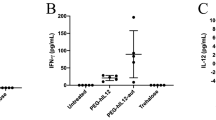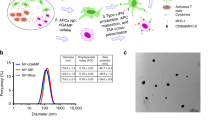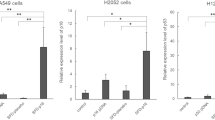Abstract
Inhibition of pulmonary metastases poses a difficult clinical challenge for current therapeutic regimens. We have developed an aerosol system utilizing a cationic polymer, polyethyleneimine (PEI), for topical gene delivery to the lungs as a novel approach for treatment of lung cancer. Using a B16-F10 murine melanoma model in C57BL/6 mice, we previously demonstrated that aerosol delivery of PEI–p53 DNA resulted in highly significant reductions in the tumor burden (P<.001) in treated animals, and also lead to about 50% increase in the mean length of survival of the mice-bearing B16-F10 lung tumors. The mechanisms of this antitumor effect of p53 are investigated in this report. Here, we demonstrate that the p53 transfection leads to an up-regulation of the antiangiogenic factor thrombospondin-1 (TSP-1) in the lung tissue and the serum of the mice. Furthermore, there is a down-regulation of vascular endothelial growth factor (VEGF) in the lung tissue and serum of the B16-F10 tumor-bearing mice treated with PEI–p53 DNA complexes, compared with untreated tumor-bearing animals. In addition, staining for von Willebrand factor (vWF), a marker for the angiogenic blood vessels, revealed that p53 treatment leads to a decrease in the angiogenic phenotype of the B16-F10 tumors. Immunohistochemistry for transgene expression reveals that the PEI–p53 aerosol complexes transfect mainly the epithelial cells lining the airways, with diffuse transfection in the alveolar lining cells, as well as, the tumor foci in the lung tissue. There was also some evidence of apoptosis in the lung tumor foci of animals treated with p53. The data suggest that aerosol delivery of PEI–p53 complexes leads to inhibition of B16-F10 lung metastases, in part by suppression of angiogenesis.
This is a preview of subscription content, access via your institution
Access options
Subscribe to this journal
Receive 12 print issues and online access
$259.00 per year
only $21.58 per issue
Buy this article
- Purchase on Springer Link
- Instant access to full article PDF
Prices may be subject to local taxes which are calculated during checkout






Similar content being viewed by others
References
Greenblatt MS, Bennett WP, Hollstein M, Harris CC . Mutations in the p53 tumor suppressor gene: clues to cancer etiology and molecular pathogenesis Cancer Res 1994 54: 4855–4878
Lowe SW, Bodis S, McClatchey A et al. P53 status and the efficacy of cancer therapy in vivo Science 1994 266: 807–810
Roth JA, Swisher SG, Meyn RE . p53 tumor suppressor gene therapy for cancer Oncology (Huntington) 1999 13: 148–154
Dameron KM, Volpert OV, Tainsky MA, Bouck N . Control of angiogenesis in fibroblasts by p53 regulation of thrombospondin-1 Science 1994 265: 1582–1584
Nagayama Y, Shigematsu K, Namba H et al. Inhibition of angiogenesis and tumorigenesis, and induction of dormancy by p53 in a p53-null thyroid carcinoma cell line in vivo Anticancer Res 2000 20: 2723–2728
Holmgren L, Jackson G, Arbiser J . p53 induces angiogenesis-restricted dormancy in a mouse fibrosarcoma Oncogene 1998 17: 819–824
Hanahan D, Folkman J . Patterns and emerging mechanisms of the angiogenic switch during tumorigenesis Cell 1996 86: 353–364
Rofstad EK, Halsor EF . Vascular endothelial growth factor, interleukin 8, platelet-derived endothelial cell growth factor, and basic fibroblast growth factor promote angiogenesis and metastasis in human melanoma xenografts Cancer Res 2000 60: 4932–4938
Li Q, Ahuja N, Burger PC, Issa JP . Methylation and silencing of the thrombospondin-1 promoter in human cancer Oncogene 1999 18: 3284–3289
Holmgren L, O'Reilly MS, Folkman J . Dormancy of micrometastases: balanced proliferation and apoptosis in the presence of angiogenesis suppression Nat Med 1995 1: 149–153
Zou Y, Zong G, Ling YH et al. Effective treatment of early endobronchial cancer with regional administration of liposome–p53 complexes J Natl Cancer Inst 1998 90: 1130–1137
Ramesh R, Saeki T, Smyth Templeton N et al. Successful treatment of primary and disseminated human lung cancers by systemic delivery of tumor suppressor genes using an improved liposome vector Mol Ther 2001 3: 337–350
Swisher SG, Roth JA et al. Adenovirus-mediated p53 gene transfer in advanced non–small-cell lung cancer J Natl Cancer Inst 1999 91: 763–771
Densmore CL, Orson F, Xu B et al. Aerosol delivery of robust polyethyleneimine–DNA complexes for gene therapy and genetic immunization Mol Ther 2000 1: 180–188
Gautam A, Densmore CL, Xu B, Waldrep JC . Enhanced gene expression in mouse lung after PEI–DNA aerosol delivery Mol Ther 2000 2: 63–70
Gautam A, Densmore CL, Waldrep JC . Inhibition of experimental lung metastasis by aerosol delivery of PEI–p53 complexes Mol Ther 2000 2: 318–323
Densmore CL, Kleinerman ES, Gautam A et al. Growth suppression of established human osteosarcoma lung metastases in mice by aerosol gene therapy with PEI–p53 complexes Cancer Gene Ther 2001 8: 619–627 In press
Gautam A, Densmore CL, Waldrep JC . Pulmonary cytokine responses associated with PEI–DNA aerosol delivery Gene Ther 8: 254–257
Fidler IJ, Nicolson GL . Tumor cell and host properties affecting the implantation and survival of blood-borne metastatic variants of B16 melanoma Isr J Med Sci 1978 14: 38–50
Kao KJ, Klein PA . A monoclonal antibody–based enzyme linked immunosorbent assay for quantitation of plasma thrombospondin Am J Clin Pathol 1986 86: 317–323
Gautam A, Densmore CL, Golunski E et al. Transgene expression in mouse airway epithelium by aerosol gene therapy with PEI–DNA complexes Mol Ther 2001 3: 551–556
Zanetta L, Marcus SG, Vasile J et al. Expression of Von Willebrand factor, an endothelial cell marker, is up-regulated by angiogenesis factors: a potential method for objective assessment of tumor angiogenesis Int J Cancer 2000 85: 281–288
Volpert OV, Lawler J, Bouck NP . A human fibrosarcoma inhibits systemic angiogenesis and the growth of experimental metastases via thrombospondin-1 Proc Natl Acad Sci USA 1998 95: 6343–6348
Jimenez B, Volpert OV, Crawford SE . Signals leading to apoptosis-dependent inhibition of neovascularization by thrombospondin-1 Nat Med 2000 6: 41–48
Jin RJ, Kwak C, Lee SG . The application of an anti-angiogenic gene (thrombospondin-1) in the treatment of human prostate cancer xenografts Cancer Gene Ther 2000 7: 1537–1542
Xu M, Kumar D, Stass SA, Mixson AJ . Gene therapy with p53 and a fragment of thrombospondin I inhibits human breast cancer in vivo Mol Genet Metab 1998 63: 103–109
Zhang L et al. Wild-type p53 suppresses angiogenesis in human leiomyosarcoma and synovial sarcoma by transcriptional suppression of vascular endothelial growth factor expression Cancer Res 2000 60: 3655–3661
Bouvet M, Ellis LM, Nishizaki M et al. Adenovirus-mediated wild-type p53 gene transfer down-regulates vascular endothelial growth factor expression and inhibits angiogenesis in human colon cancer Cancer Res 1998 58: 2288–2292
Nishizaki M, Fujiwara T, Tanida T et al. Recombinant adenovirus expressing wild-type p53 is antiangiogenic: a proposed mechanism for bystander effect Clin Cancer Res 1999 5: 1015–1023
Sheu JR, Fu CC, Tsai ML, Chung WJ . Effect of U-995, a potent shark cartilage-derived angiogenesis inhibitor, on anti-angiogenesis and anti-tumor activities Anticancer Res 1998 18: 4435–4441
Shalinsky DR, Brekken J, Zou H et al. Broad antitumor and antiangiogenic activities of AG3340, a potent and selective MMP inhibitor undergoing advanced oncology clinical trials Ann NY Acad Sci 1999 878: 236–270
Kalechman Y, Strassmann G, Albeck M, Sredni B . Up-regulation by ammonium trichloro(dioxoethylene-0,0′) tellurate (AS101) of Fas/Apo-1 expression on B16 melanoma cells: implications for the antitumor effects of AS101 J'Immunol 1998 161: 3536–3542
Author information
Authors and Affiliations
Corresponding author
Rights and permissions
About this article
Cite this article
Gautam, A., Densmore, C., Melton, S. et al. Aerosol delivery of PEI–p53 complexes inhibits B16-F10 lung metastases through regulation of angiogenesis. Cancer Gene Ther 9, 28–36 (2002). https://doi.org/10.1038/sj.cgt.7700405
Received:
Published:
Issue Date:
DOI: https://doi.org/10.1038/sj.cgt.7700405
Keywords
This article is cited by
-
Cucurbitacin B inhibits TGF-β1-induced epithelial–mesenchymal transition (EMT) in NSCLC through regulating ROS and PI3K/Akt/mTOR pathways
Chinese Medicine (2022)
-
p53 gene therapy of human breast carcinoma: using a transferrin-modified silica nanoparticles
Breast Cancer (2016)
-
Intratumoral gene therapy versus intravenous gene therapy for distant metastasis control with 2-Diethylaminoethyl-Dextran Methyl Methacrylate Copolymer Non-Viral Vector–p53
Gene Therapy (2014)
-
Emerging applications of nanoparticles for lung cancer diagnosis and therapy
International Nano Letters (2013)
-
2-diethylaminoethyl-dextran methyl methacrylate copolymer nonviral vector: still a long way toward the safety of aerosol gene therapy
Gene Therapy (2013)



